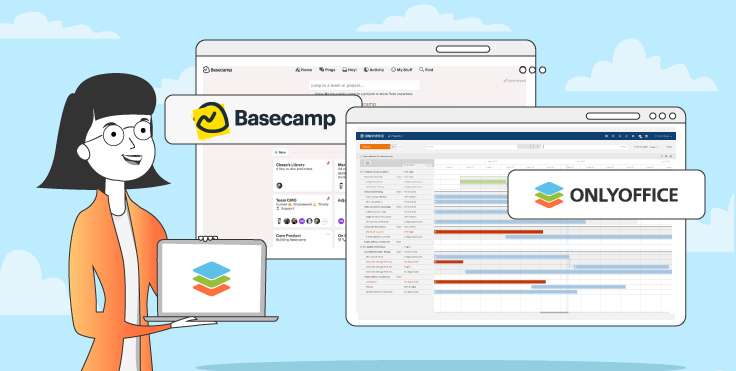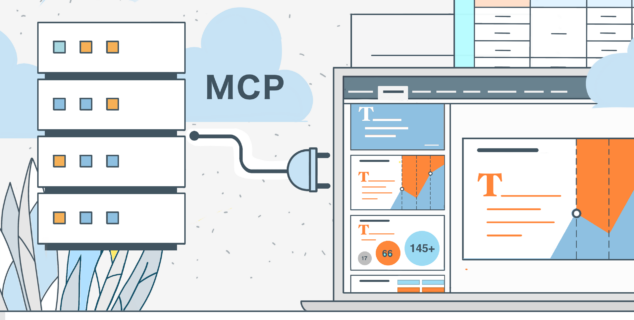Top 12 Basecamp alternatives in 2025
Looking for a free alternative to Basecamp for project management and team communication? Consider one of these ten free and paid solutions!

In this article, we‘ll give you a comprehensive overview of the most common requirements for software like Basecamp and some reasons to look for a new solution.
After reading this post you‘ll learn what the best Basecamp alternatives are, their key features and pricing, strengths and drawbacks based on independent customer reviews.
What is Basecamp?
Basecamp is a cloud-based service for project management and team communication. It includes important business features, including messaging, real-time chat, schedules and to-do lists, file storage, and document workflow.
Basecamp has some significant advantages for remote teams:
- Favorable pricing. Basecamp does not roll out unmotivated prices. The free plan provides 20 users with 3 projects and 1 GB of storage space. The Business plan is just $99 per team every month.
Whether you have 10 or 100 users, the price remains $99 per month. This makes Basecamp much more affordable for smaller teams compared to the competition.
- Comfortable communication. Basecamp makes the interaction between team members really diverse. Project-related team charts, a message board, Pings for private messages, Campfires for informal discussions.
Communication is one of the key features of Basecamp.
- User-friendly interface. Basecamp is easy to learn and navigate through even for less tech-savvy users. Many people also love it for a powerful search. You can find everything across files, projects, and chats without switching between countless tabs.
These major advantages make teams worldwide decide for Basecamp.
Why do you need a Basecamp project management alternative?
Above we listed some persuasive strengths of Basecamp. Now about drawbacks — most of the provided features and tools are pretty basic. They can be good for simple projects, such as collaborative blogs. Larger teams often need more advanced and customizable functionalities.
Here are some common reasons why people want to find Basecamp software alternatives.
No reporting tools
With Basecamp, you can‘t expect data-driven project management. The solution doesn’t have analytical tools to gain useful insights.
There is no Gantt chart view or another way to visualize dependencies between tasks and due dates. Meanwhile, such features are necessary for project control managers to make sure orders are delivered against the negotiated deadlines.
No time tracking
Project management software is also valuable for time tracking tools. They let employees analyze the current workload and assess how much extra time the team needs to finish the task. Basecamp does not have such feature, you‘ll need to integrate a third-party app.
No subtasks
Complex projects always have a multi-level structure where many tasks are divided into smaller subtasks with a dedicated assignee. Basecamp doesn‘t have subtasks.
No project overview
Many users who tested Basecamp would like to have an overview of the entire workflow, not a single project. Such information can be valuable for stakeholders and other decision makers. Unfortunately, Basecamp doesn‘t seem to provide such functionality.
No tags and labels for tasks
In large projects, the priority and nature of each task are not the same. Basecamp users can‘t tag a task with labels or mark one as important.
These are just some of the most common drawbacks and reasons why businesses want to run an alternative to Basecamp — free of charge and on a commercial basis.
Basecamp alternatives: what to look for?
Whether you need a self-hosted Basecamp alternative or just want a free solution for project management and team communication, there must be fundamental features and tools in new software.
Let‘s look at some important components in Basecamp alternatives.
1. Project management
When it comes to managing a complex project engaging multiple teams from different fields, you need a clear understanding of milestones, progress of each task, budget and scheduling. Without the appropriate software for project management and project controls, the team can lose the track of events. As a result, you notice late deliveries and additional costs.
To avoid unwanted risks, businesses need tools to do the following:
- Assign tasks to employees
- Track down progress
- Set deadlines
- Browse workload
- Communicate
- Create reports
The list can be extended or customized depending on the requirements of your team.
Examples of popular project management solutions are Wrike, Asana, monday.com.
2. Electronic document workflow
Many teams exсhange hundreds of documents everyday, whether it is a product of their job or corporate papers. Text documents, spreadsheets, and presentations are at the cornerstone of content collaboration in remote companies. Today simple editing is not enough — a document can be co-authored by ten people or even more. The seamless collaboration includes the following:
- Secure storage and sharing
- Collaborative editing
- Tracking changes
- Version history
- Commenting
A successful document workflow starts with an office suite and necessary add-ons. Among the most trusted office solutions are Microsoft 365, Google Workspace, ONLYOFFICE DocSpace.
Choose a simple and user-friendly solution. The team should spend as little time as possible learning how to use new software.
3. Communication
Remote teams need a corporate social environment to exchange messages instantly. Email can become too slow and messy for team communication — use your inbox to send bulky and confidential files to customers and partners.
Forum-based discussions are always a good way to brainstorm the ongoing issues with teammates. Try secure messengers, e.g. Telegram or Signal.
Quick tip: Separate working chats from personal ones. Telegram allows creating a folder to group chats with your colleagues and find them quickly.
4. Customer relations management
Client-oriented business is the key to success. How to build relationships with your prospects and turn potential customers into loyal audience?
Start with a customer relationship management (CRM) system to see the entire customer lifecycle and support clients on their way to purchase. With such software, you can create customer databases, add contacts, deal opportunities, save communication history, create invoices and reports, etc.
The popular CRM providers are Salesforce, HubSpot, Bitrix24.
5. Planning and scheduling
Remote teams need to keep track of corporate and personal events. That is where calendars from Yahoo! or Apple still do their job. But they must be group calendars available for all employees engaged.
Add meetings, conferences, vacation dates, sometimes birthdays, and other events to a team calendar. Ideally, calendars must be integrated with your project management solution and CRM system.
We based our list of the best Basecamp alternatives on these five tasks. Most of the services allow integrating third-party apps for additional features.
The 12 best Basecamp alternatives
We gathered the top-recommended solutions for those who want to replace Basecamp with a free, open-source, or proprietary service and unlock new project management features.
1. ONLYOFFICE DocSpace
ONLYOFFICE DocSpace is a collaborative platform designed for document management and team collaboration. It combines document editing, project management, and communication tools into a single solution, making it a versatile alternative to Basecamp for teams that prioritize document-centric workflows.
ONLYOFFICE DocSpace key features:
- Real-time document editing and collaboration
- Customizable environments for teams and projects
- Integrated document storage and file sharing
- Task and project management tools
- Communication tools (chat, comments, and mentions)
- Advanced access controls and permissions
ONLYOFFICE DocSpace vs Basecamp
ONLYOFFICE DocSpace stands out from Basecamp with its strong focus on document collaboration and editing. Unlike Basecamp, which is more focused on task and project management, DocSpace provides robust tools for creating, editing, and sharing documents in real time, making it ideal for teams that rely heavily on document workflows. Additionally, its integrated communication tools and customizable workspaces offer a more flexible environment for collaboration. However, DocSpace does not provide project management and email management features.
ONLYOFFICE DocSpace pricing
ONLYOFFICE DocSpace offers a free cloud-based plan with basic features and an unlimited number of users and guests. The Business Plan starts at $20 per admin per month, while the self-hosted Enterprise Plan provides advanced customization and support options, with pricing starting from $6550 per server (lifetime purchase).
ONLYOFFICE rating
Capterra — 4.5 (105 reviews)
Software Advice — 4.5 (305 reviews)
Discover the benefits of ONLYOFFICE DocSpace for your team today! Try it free in the cloud or host it on your server.
START IN CLOUD DEPLOY ON-PREMISES
For the cloud version, 30 free days of the Business plan are included — later you can choose to stay or switch to the free Startup plan.
2. ClickUp
ClickUp is a popular solution with project management features, customizable tasks, nested subtasks and checklists, 15 different views to monitor workflow, automation for repetitive tasks, reporting tools.
Another cloud-based service, ClickUp enables disaster recovery, data encryption and retention, role-based access control, and other common security features. Currently, ClickUp does not run locally.
ClickUp key features
- Project planning
- Recurring task automation
- Time tracking
- Workflow visualization
- Collaboration on documents
ClickUp vs Basecamp
ClickUp offers unlimited users and unlimited projects. The solution lets you send and receive emails right within ClickUp tasks, leave comments to documents, choose between 50+ automation rules, create custom priorities, and more.
Basecamp and ClickUp can be integrated. Any action in Basecamp will generate a new task in ClickUp. The integration makes a mix of efficient project management and team communication.
ClickUp pricing
The free plan offers real-time chat, document collaboration, email, Kanban boards, 100 MB storage, and time tracking. For $5 per user/month, you unlock project management features, such as Dashboard view, Gantt charts, agile reporting. Other plans for $9 and $19 per user/month allow customization, advanced workload management, and automation.
ClickUp rating
Capterra — 4.7 (2343 reviews)
Software Advice — 4.7 (2313 reviews)
3. Asana
Asana is often preferred by companies as an alternative to Basecamp for project management with important tracking tools. Entirely cloud-based, it provides distributed teams with a centralized environment for planning and monitoring activities.
This solution is not among self-hosted Basecamp alternatives. Asana provides such security tools as multi-factor authentication and Google SSO. Some of them are only available in the plan for large enterprises, namely data export and deletion, SAML, cross-regional backups.
Asana key features
- Project management
- Kanban-style boards
- Automation for recurring tasks
- Monitoring workload
- Request tracking
Asana vs Basecamp
Asana is one of the best alternatives to Basecamp which provides analytics. Different views like Kanban-style boards, Gantt charts, forms, and calendars make projects easier to visualize and comprehend. Managers can plan and see the workload in real time.
Asana is not easy on the wallet for a smaller team. Some features are only available within the most expensive plan, whereas a free plan is very limited.
Asana pricing
Asana is more expensive than Basecamp — the prices start from $10,99 per user/month. Be ready to shell out $24,99 per user/month for all features, custom automation rules, and advanced integrations.
Asana rating
Capterra — 4.4 (10101 reviews)
Software Advice — 4.4 (9899 reviews)
4. Wrike
Wrike is a project management solution with a focus on Gantt charts. Users can build analytics to learn insights about team performance and see infographics to know project implementation status.
Wrike is not available on-premises and seems to provide most security tools for large teams only. SSO, 2FA, audit reports, and custom access roles will be unlocked in the enterprise-grade plan.
Wrike key features
- Project management
- Workflow visualization
- Automation for recurring tasks
- Request forms
- Team calendars
Wrike vs Basecamp
Wrike is initially a project management app with a focus on maximizing task organization and productivity, planning projects with deadlines, setting task dependencies, etc. There is native scrum management, time tracking, reporting tools.
Basecamp is more about team communication and offers an affordable environment with an intra-company chat, calendars, to-do lists, and file storage.
Wrike pricing
The free plan provides you with basic task management, 2 GB storage space, cloud storage integrations, and Board view.
Advanced plans for $9,80 and $24,80 per user/month have more storage space and enable connecting professional services, such as MS Project, Salesforce, and Business Intelligence.
Wrike rating
Capterra — 4.2 (1687 reviews)
Software Advice — 4.2 (1687 reviews)
5. monday.com
Monday.com is a highly customizable project management solution. Managers can adapt it to any team, create projects, plan events, and track progress. Native tools and integrated third-party apps let managers gain insights into the way the team performs.
While self-hosting is unavailable for Monday.com, the service promises data encryption and two-factor authentication. Sadly, most security features like SSO and IP restriction are only included in the most expensive plan.
Monday.com key features
- Project management
- Workflow visualization
- Automation for recurring tasks
- Communication in threads
- Document workflow
Monday.com vs Basecamp
Monday.com is easy to use and looks intuitive. The solution offers reporting for general project progress, budgets, KPIs, etc. Teams can personalize schedules, manage all documents and conversations centrally, stay updated on the latest progress.
Basecamp users love how the app informs them about the progress, whereas Monday.com can become very busy with notifications.
Monday.com pricing
Monday.com is not a cheaper Basecamp alternative.
The free plan accommodates up to 2 team members. Larger teams need to upgrade to one of the paid plans from $8 per user/month. The Pro plan is twice as expensive.
Monday.com rating
Capterra — 4.6 (2478 reviews)
Software Advice — 4.6 (2437 reviews)
6. ProofHub
ProofHub is an all-in-one project management and team collaboration tool designed to streamline workflows and enhance productivity. It offers a comprehensive suite of features that cater to teams of all sizes, making it a strong alternative to Basecamp.

ProofHub key features:
- Task management
- Gantt charts
- Proofing and approvals
- Time tracking
- File sharing and storage
- Custom roles
ProofHub vs Basecamp
ProofHub stands out as a more comprehensive project management solution compared to Basecamp. While Basecamp focuses on simplicity and core collaboration features, ProofHub offers advanced tools like Gantt charts, time tracking, and custom roles, making it better suited for teams that need detailed project planning and control. Additionally, ProofHub’s flat-rate pricing is a significant advantage for larger teams, as it doesn’t charge per user. However, one drawback of ProofHub is its limited third-party integrations, which might be a concern for teams relying heavily on external tools.
ProofHub pricing
ProofHub offers two pricing plans: the Essential Plan at 45 USD/month(billed annually) for unlimited users and projects, and the Ultimate Control Plan at 89/month (billed annually) with additional features like custom roles and advanced reports.
ProofHub rating
Capterra — 4.6 (127 reviews)
Software Advice — 4.6 (127 reviews)
7. Nuclino
Nuclino is a lightweight and intuitive collaboration tool designed to help teams organize knowledge, manage projects, and work together more efficiently. With its clean interface and focus on simplicity, Nuclino is a great alternative to Basecamp for teams looking for a more flexible and modern solution.

Nuclino key features:
- Real-time collaboration
- Hierarchical organization with workspaces and items
- Task management and to-do lists
- Document editing and formatting
- Integrated search and navigation
- Embeddable content (e.g., videos, files, and diagrams)
Nuclino vs Basecamp
Unlike Basecamp, which is more structured around project boards and message boards, Nuclino provides a flexible, wiki-like workspace that adapts to various workflows. Its hierarchical organization and embeddable content make it ideal for teams that need to centralize knowledge and collaborate on documents. However, Nuclino lacks some of the advanced project management features found in Basecamp, such as time tracking and client access, which might be a limitation for teams with more complex project needs.
Nuclino pricing
Nuclino offers a free plan for small teams with limited features. The Standard Plan is priced at 5 USD per user/mo (billed annually) and the Premium Plan costs 10 USD per user/mo (billed annually), offering advanced features like version history and advanced access controls.
Nuclino rating
Capterra — 4.7 (105 reviews)
Software Advice — 4.7 (105 reviews)
8. Google Workspace
Formerly known as G Suite, Google Workspace provides business users with editing text documents, spreadsheets, and presentations, calendar, Gmail, extended cloud file storage. The communication tools are chat and video meetings.
Google Workspace is only available online, security measures include but are not limited to data encryption and recovery, information rights management (IRM), 2FA, SSO, and much more.
Google Workspace key features
- Document editing
- File storage
- Communication via chat and video meetings
- Email management
- Calendar
Google Workspace vs Basecamp
There are more communication tools in Google Workspace. Email, chat, personal or group video conferences with hundreds of participants! You get terabytes of corporate storage, advanced document editing features, and planning with calendars.
Basecamp has basic project tracking tools that are enough for smaller teams. Google Workspace does not have project management features at all.
Google Workspace pricing
There is no free corporate plan, the cheapest one costs $6 per user/month and includes all features and tools. Other plans just accommodate more participants in video conferences, storage, and advanced security. They cost $12 and $18 per user/month respectively.
You can make a solid Basecamp personal alternative of Google Workspace. Each separate app is available for home use free of charge.
Google Workspace rating
Capterra — 4.7 (10887 reviews)
Software Advice — 4.7 (10887 reviews)
9. Toggl Plan
Toggl Plan is a dedicated solution for scheduling tasks and project milestones, creating custom workflows and managing them using timelines and Kanban board. Promoted as a Basecamp alternative, it has a strong focus on project planning.
Toggl Plan does not seem to have much focus on enterprise-level security. You may expect SSO and data encryption though. Self-hosting is also unavailable for this solution.
Toggl Plan key features
- Project planning
- Resource planning
- Task management
- Workflow visualization
Toggl Plan vs Basecamp
Independently from the pricing plan, in Toggl Plan you get an unlimited number of workspaces, project timelines, milestones, and tasks. There is a native tool for time tracking, creating recurring tasks, adding multiple assignees to a task.
There are no team chats in Toggl Plan. It is a major drawback for bigger teams — additionally, they will have to find a free Basecamp alternative for communication.
Toggl Plan pricing
The plan for a team costs $8 per user/month and includes all features and tools except for project data exports, inviting guests, and SSO. The price can be reasonable if you need task management more than team communication.
Toggl Plan rating
Capterra — 4.5 (105 reviews)
Software Advice — 4.7 (1743 reviews)
10. Trello
Trello is an online project management program where you’ll be able to arrange and organize everything. From huge group projects to individual assignments, study, travels, etc. Nowadays Trello is probably the best Basecamp personal alternative.
The solution is only available for deployment in the cloud. Common security tools are among others 2FA, SSO, data encryption and deletion, backups and disaster recovery.
Trello key features
- Project planning
- Recurring task automation
- File attachment
- Mobile-friendly views
Trello vs Basecamp
Trello is your digital blackboard where you can add tasks in Kanban style. With apps for iOS and Android mobile devices, Trello also became a Basecamp software alternative for offline work — you can make projects available without an Internet connection.
Unfortunately, Trello doesn‘t have a native chat for in-team communication. If you need to interact, the best idea is to use Trello alongside Basecamp or third-party messengers.
Trello pricing
Trello has a free plan with up to 10 boards, unlimited cards, members, and an activity log. The paid plan for up to 100 members costs $10 per user/month. Thus, Trello is far from a free Basecamp alternative for business teams.
Trello rating
Capterra — 4.5 (20186 reviews)
G2 — 4.4 (12009 reviews)
11. Bitrix24
Bitrix24 is a social enterprise platform with rich functionalities for collaboration, task and project management, client base management, collaborative document editing, exchanging files, and business automation.
Availability of on-premise installation makes Bitrix24 one of the self-hosted Basecamp alternatives. The solution provides security with SSL and RSA encryption, 2FA, custom backup rules.
Bitrix24 key features
- Project management
- Document editing & collaboration
- Business automation
- CRM system
- File storage
Bitrix24 vs Basecamp
Bitrix24 is powerful in collaboration with chat, video calls, feed, company workspace, and knowledge base. You can manage projects, delegate and set tasks, navigate between tasks and projects using different views: Deadline, Planner, Kanban board, Gantt chart, or Calendar. Each account has file storage of up to 1TB. CRM with unlimited deals and contacts is also included.
Most of the awesome features in Bitrix24 are only available in the expensive plans. Some users report that audio conferencing does not work well in Bitrix24. However, the solution is a good alternative to Basecamp for sales departments.
Bitrix24 pricing
The free plan lets you get on board with basic project management and communication features, including up to 48 people in video conferences, public and private chats. To unlock the full potential of Bitrix24, you have to pay $159 per month for the whole team (not per user).
Taking into consideration the powerful features of Bitrix24, it is one of the best Basecamp alternatives for a similar price.
Bitrix24 rating
Capterra — 4.0 (485 reviews)
Software Advice — 4.0 (485 reviews)
12. OpenProject
OpenProject is another Basecamp open-source alternative for on-premise deployment. This free software for classical and agile project management will support your team along the entire project life-cycle. With numerous features and plugins, the solution helps manage complex projects in big teams.
OpenProject is a self-hosted alternative to Basecamp. After deployment, you get basic security measures that are user management and two-factor authentication. The source code is open and transparent — you can check it on malware and backdoors.
OpenProject key features
- Project management
- Bug tracking
- Compatibility with Agile and Scrum
- Resource management
- Creating product roadmap
OpenProject vs Basecamp
All project management features are available in the free Community version of OpenProject. They are a project overview page, product roadmap, meetings management, time tracking, budgeting and cost reporting, bug tracking, calendars, and more. Advanced features unlock agile boards and improved security.
Basecamp is better in communication — in OpenProject, you can only brainstorm ideas together in discussions. Teams may need a separate app for private instant messaging. Some people report a sharp learning curve and unavailability of Kanban boards in OpenProject.
OpenProject pricing
OpenProject users prefer this software as the best free Basecamp alternative. Paid Enterprise can be hosted in the cloud and on-premises, includes professional support, customization, and security features.
OpenProject rating
Capterra — 4.3 (46 reviews)
Software Advice — 4.2 (45 reviews)
Final thoughts
We learned what are the best Basecamp alternatives for project management and what to look for when choosing one. The decision depends on the vast majority of factors and your individual requirements for the software. Should it be free and open-source? Cloud-based and comprehensive? What is the most important for your team — project management features, communication, document workflow, or something else?
All the best Basecamp alternatives from our list offer free pricing plans or trial periods. Test any solution with your team, gather feedback, and assess the efficiency of the software for your business.
Create your free ONLYOFFICE account
View, edit and collaborate on docs, sheets, slides, forms, and PDF files online.


